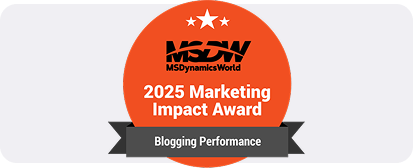Dynamics CRM vs Business Central Difference b/w them | 2025
As we all know, proper CRM implementation helps streamline workflow, enhance customer relationships, and accelerate growth. If we talk about Canadian businesses, there are two main Microsoft options to consider, including CRM in Business Central and Dynamics 365 CRM.
Yet, they both belong to the Microsoft trusted ecosystem, although they have diverse objectives. Dynamics 365 Business Central CRM provides customer management capabilities in a full business management system, and Dynamics 365 CRM is totally about sales, marketing, and service performance optimization.
In this article, we will understand the comparison of Dynamics CRM vs Business Central and help you to choose the right fit for your business.
So, before getting into a more in-depth comparison of these, we need to understand what Dynamics CRM and Business Central actually are.
Overview of Dynamics CRM
Microsoft Dynamics CRM is a customer relationship management platform through which you can better control and connect with your customers. It makes the sales, customer insights (marketing), and customer service more straightforward, while it also deploys AI insights to personalize communication and maximize satisfaction.
Dynamics 365 CRM is your choice when it comes to the aspect of building and maintaining client relationships, which is critical to the success of your business.
Overview of Dynamics 365 Business Central
Business Central is a complete business management solution made to accommodate small- to medium-sized enterprises (SMEs). It takes your foundation business processes—finance, supply chain, inventory, operations, and project management—and it also covers Business Central CRM modules, which contain simple customer management, opportunity tracking, and service management modules. It is your core system of operating the business, where all the CRM capabilities will be embedded into the way business is run.
Features & Benefits
Microsoft Dynamics 365 CRM
Features:
- Customer Engagement Modules: Sales, Customer Insights, Customer Service, and Field Service.
- AI-Driven Insights: Actionable data analysis and predictive analytics.
- Customization & Integration: Boosted with Power Platform and Azure integrations.
- Mobile Accessibility: Access data anytime, anywhere.
- Automation & Workflows: Streamline repetitive tasks.
Benefits:
- Enhanced customer insights for better decision-making.
- Increased sales efficiency.
- Improved customer satisfaction.
- Fully scalable as your business grows.
Business Central
Features:
Comprehensive Business Management: Finance, supply chain, operations, and project management.
Embedded CRM: Basic customer management tied directly into operational workflows.
Intuitive User Interface: Ease of use and quick deployment.
Flexible & Customizable: Tailored to industry needs.
Cloud-Based & Secure: Data security and remote access.
Benefits:
- Single platform for end-to-end business processes.
- Improved operational efficiency.
- Real-time financial visibility.
- Simplifies complex business processes.
CRM Capabilities in Business Central
Although Dynamics 365 Business Central is primarily developed to run the core activity of the business (finance, inventory, and supply chain), it still does not neglect customer management.
The Microsoft Business Central CRM module comprises
- Simple customer information processing: Save and categorize customer data in a single location.
- Opportunity tracking: Keep track of potential dealings as they progress from the initiation to the closing of the deal.
- Contact and service management: Maintain full contact history, with knowledge of customer service interactions.
- Integration into campaign management: Connect with marketing tools to run and track targeted campaigns.
Advantages and Disadvantages: Dynamics CRM and Business Central
In a comparison between Dynamics 365 CRM and CRM in Business Central, it usually depends on your business priorities, whether it is enhanced customer relationships or overall operation management.
Dynamic 365 CRM
Advantages:
Advanced CRM features: Full package of sales, marketing, customer service, and field service.
AI-driven insights: Predictive analytics and better decision-making.
Highly customizable: Built to be extended with Power Platform, Azure, and industry-specific apps.
Automation at scale: Automate workflows across sales and service businesses.
Scalable: Grows together with your business, ideal for enterprises and growing SMEs.
Disadvantages
Higher cost: It is mostly expensive as compared to CRM in Business Central, particularly for its advanced features.
Complexity in small teams: May take greater setup and training in the case of smaller organizations.
Dynamics 365 Business Central CRM module
Advantages
- One platform solution: All finance, operations, supply chain, and rudimentary CRM on one system.
- Affordable: Perfect for SMEs, which do not desire multiple licenses to get business and customer management together.
- User-friendliness: The interface ensures easy adoption.
- Compatible with Microsoft seamlessly: Compatible with Outlook, Teams, Power BI, and other Microsoft 365 apps.
- Business Central CRM integration: Connects with Dynamics 365 CRM to add new features.
Disadvantages
- Basic advanced CRM capabilities: No AI-based marketing automation, detailed analytics, and advanced sales.
- Simple reporting against Dynamics CRM: It is good in the raw operations but not good around customer engagement insights.
Comparison: Dynamics CRM vs Business Central
| Feature | Dynamics 365 CRM | Business Central |
|---|---|---|
| Focus | Customer relationship management | Complete business management with CRM modules |
| Core functionalities | Sales, marketing, customer service | Finance, supply chain, operations, basic CRM |
| Customizability | Highly customizable and extendable | Customizable for SME needs |
| AI & automation | Advanced AI-driven insights | Basic automation |
| Integration | Deep integration with Microsoft 365, Power Platform | Integrates with Microsoft 365, user-friendly for SMEs |
| Ideal for | Growing enterprises requiring advanced CRM functionalities | Small to medium-sized businesses seeking unified solutions |
The decision between Business Central and Microsoft Dynamics CRM is solely based on the size, requirements, and expansion goals of your company. Dynamics 365 CRM is the best option if extensive customer involvement, sales and marketing automation, and data-driven insights are your top priorities. Business Central provides a complete, integrated platform for end-to-end business management with specific CRM features.
Dynamics Square, A Microsoft Dynamics Partner help Canadian companies throughout their entire implementation journey, all the way through to deployment and support. With us, you will receive a uniquely designed, scalable, and economical Microsoft-powered solution that will support the growth of your business at a high speed.
Have a question about how Dynamics CRM or Business Central can take your business to the next level in Toronto and across Canada?
Contact us at +1 778 381 5388 or info@dynamicssquare.ca.
People Also Ask:
1. What does Dynamics 365 Business Central cost?
Essentials: CAD $95 per user/month
Premium: CAD $135.70 per user/month
Team Member: CAD $10.90 per user/month
Note: New Business Central pricing that takes effect on October 1, 2025, raises these prices to about $109.42 (Essentials) and $150.46 (Premium) and introduces additional storage
2. Is Dynamics and CRM the same?
No. Dynamics 365 is the larger set of Microsoft business apps. Customer Relationship Management (CRM), such as Dynamics 365 Sales, Marketing, or Customer Service, are niche-type products that address customer interactions. Other Dynamics solutions, e.g., Business Central, manage ERP-related processes.
3. Is Business Central superior to Dynamics 365 Customer Service?
Yes, at least in case your focus is on customer support. Dynamics 365 Customer Service comprises case management, multi-channel support routing, and AI-enabled help desk situations. Business Central is a very powerful platform when it comes to finance and operations but has basic CRM functionalities that are not designed to cater to the entire customer service process.


